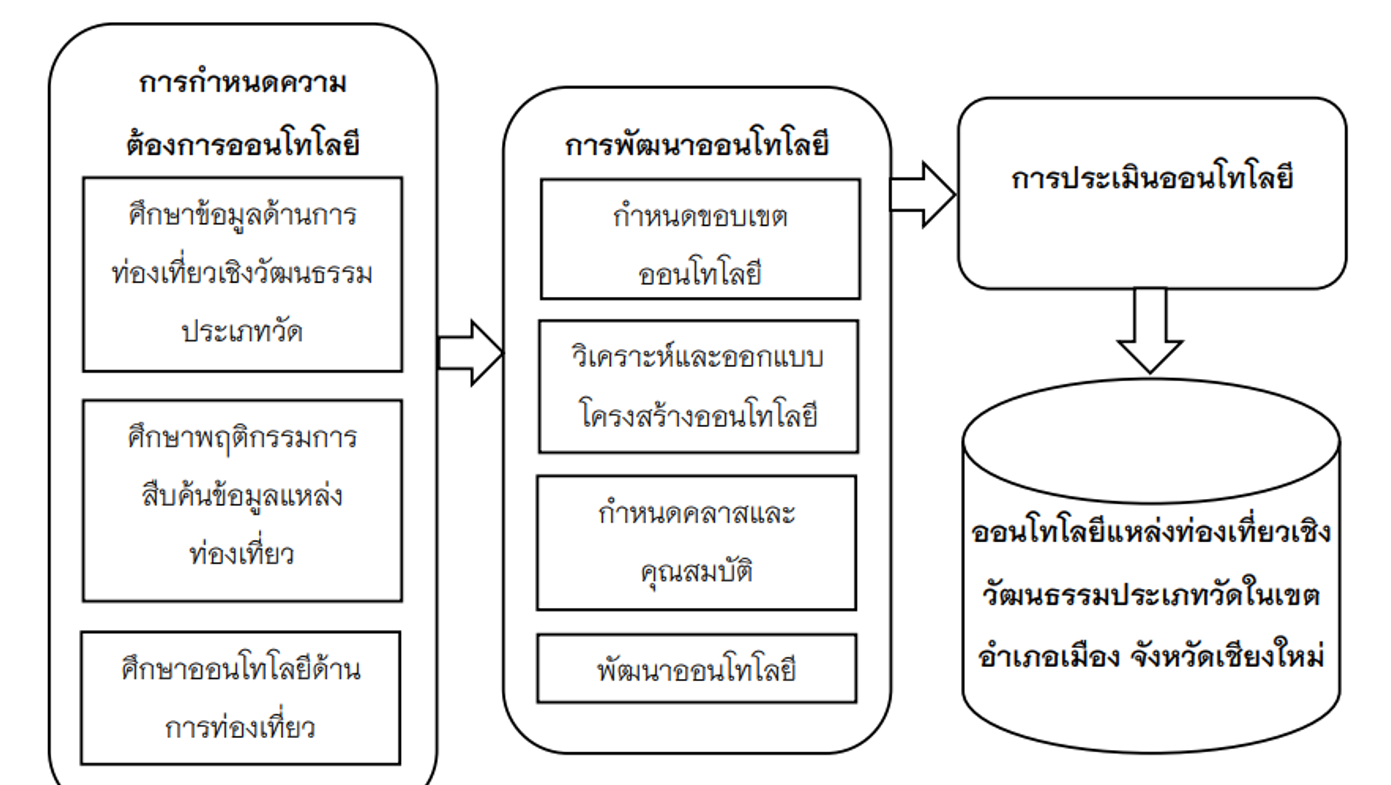Development of Ontology of Cultural Attraction Temple's in Muang District Chiang Mai Province
Keywords:
Ontology, Cultural Sites, Temple AttractionsAbstract
This research aim to development of ontology of cultural attraction temple's in Muang District Chiang Mai Province by analyzing the content of data sources, which are the existing costs. religious places using the theory of classification of cultural tourist attractions in the temple type in Muang district. Chiang Mai. The research process is divided into 3 phases: Phase 1) Determination of ontology requirements which studying the information on cultural tourism in the temple type from books, textbooks, documents, concepts, theories and related research. as well as studying behaviors in searching for tourist attractions in theirs, the survey was conducted from the tourist attraction information search behavior as a measure of 400 tourists from an online questionnaire to analyze the searched data by frequency. percentage to group words, phase 2) development of ontology using Protégé, class design, defining main classes, subclasses, hierarchies, properties to establish the relationship of data in each class, and phase 3) ontology assessments was divided into two parts: assessing the suitability of an ontology structure by an expert with the inter-class correlation validity assessment scale. and evaluation of cultural grouping data. The results showed that development ontology of cultural tourist attractions in the temple in Muang District Chiang Mai are definition value scope and objectives of development found to be suitable (average score = 0.93) in three areas: grouping and ordering of classes within the ontology (score value = 1.00), defining affinity name and class properties (scoring value = 0.89), and appropriate content of the overall ontology (score value = 1.00).
References
กรกนก สนิทการ. (2561). การศึกษาคุณลักษณะของสือประเพณีจองพาราและการนำไปใช้ในการท่องเที่ยวเชิงวัฒนธรรมของจังหวัดแม่ฮ่องสอน. วารสารมนุษยศาสตร์และสังคมศาสตร์ มหาวิทยาลัยพะเยา, 6(1), 123-143.
กรรณิกา คำดี. (2558). วัดและศาสนสถานในมิติของการท่องเที่ยว. บัณฑิตวิทยาลัยมนุษยศาสตร์และสังคมศาสตร์มหาวิทยาลัยขอนแก่น, 4(2), 175-191.
เขมิกา ธีรพงษ์. (2563). การพัฒนาการท่องเที่ยวเชิงวัฒนธรรมด้วยการออกแบบประสบการณ์. ศิลปกรรมสาร, 13(1), 1-15.
จุฑาทิพย์ ไชยกำบัง และ กุลธิดา ท้วมสุข. (2560). การพัฒนาออนโทโลยีเชิงความหมายของความรู้เกี่ยวกับกลุ่มชาติพันธุ์. วารสารวิจัย สมาคมห้องสมุดแห่งประเทศไทยฯ, 10(2), 1-15.
จุฑาภรณ์ หินซุย และ สถาพร มงคงศรีสวัสดิ์. (2557). แนวทางส่งเสริมการท่องเที่ยวเชิงพุทธ กรณีศึกษาวัดประชาคมวนาราม อำเภอศรีสมเด็จ จังหวัดร้อยเอ็ด. วารสารวิชาการการท่องเที่ยวไทยนานาชาติ, 10(1), 20-58.
ชมภูนุช หุ่นนาค. (2559). การพัฒนาการท่องเที่ยวเชิงประวัติศาสตร์ในจังหวัดสมุทรสงคราม. วารสารวิทยบริการ มหาวิทยาลัยสงขลานครินทร์, 27(1), 39-46.
ฐิณาภัณฑ์ นิธิยุวิทย์. (2563). ระบบแนะนำแหล่งท่องเที่ยวทางธรรมชาติอำเภอเขาค้อด้วยหลักการออนโทโลยี. วารสารวิทยาศาสตร์และเทคโนโลยี มหาวิทยาลัยมหาสารคาม, 39(5), 514-522.
บุญส่ง สินธุ์นอก, พระสมุห์กฤติพิสิฐ กิตฺติธมฺโม, ฐิติวรรณ สินธุ์นอก และ ธวัญหทัย สินธุนอก. (2563). การวิเคราะห์ผลกระทบ จุดแข็ง และจุดอ่อนของการท่องเที่ยวทางพระพุทธศาสนาและวัฒนธรรมไทย-ลาว. วารสารปัญญาปณิธาน, 5(1), 54-66.
พระจํานงค์ ผมไผ, ยุภาพร ยุภาศ และ ภักดี โพธิ์สิงห์. (2563). วัดกับการส่งเสริมการท่องเที่ยวบนเส้นทางลุ่มน้ำโขง. วารสารสังคมศาสตร์และมานุษยวิทยาเชิงพุทธ, 5(5), 158-170.
พระชยานันทมุนี, วรปรัชญ์ คําพงษ์, พระครูฉันทเจติยานุกิจ, พระปลัดนฤดล กิตติภทฺโท และ อรพินท์ อินวงค์. (2562). ความสัมพันธ์การท่องเที่ยวเชิงวัฒนธรรมของวัดและชุมชนในล้านนา. วารสารสันติศึกษาปริทรรศน์ มจร, 7(2), 315-331.
ยงยุทธ ชัยรัตนาวรรณ. (2557). พฤติกรรมของนักท่องเที่ยวและปัจจัยที่ทำให้เกิดการเที่ยวซ้ำของวัดห้วยปลากั้ง จังหวัดเชียงราย. วารสารมนุษยศาสตร์และสังคมศาสตร์ มหาวิทยาลัยพะเยา, 2(1), 64-72.
รัฐนันท์ พงศ์วิริทธิ์ธร และ กัญญากาญจน์ ไซเออร์ส. (2559). แนวทางการพัฒนาการท่องเที่ยวจังหวัดเชียงใหม่ตามทัศนะของนักท่องเที่ยวเพื่อความยั่งยืน. วารสารวิชาการมหาวิทยาลัยธนบุรี, 10(22), 60-66.
วรงค์พร คณาวรงค์. (2557). การพัฒนาออนโทโลยีแหล่งท่องเที่ยวเชิงวัฒนธรรม. (วิทยานิพนธ์ปริญญามหาบัณฑิต). นครราชสีมา: มหาวิทยาลัยเทคโนโลยีสุรนารี. จาก http://sutir. sut.ac.th:8080/jspui/bitstream/123456789/6067/2/Fulltext.pdf.
วิไลรัตน์ ยาทองไชย. (2560). ออนโทโลยีกับการพัฒนาฐานความรู้. วารสารวิทยาศาสตร์และเทคโนโลยี, 1(2), 47-58.
อิสรา ชื่นตา, จารี ทองคำ และ จิรัฏฐา ภูบุญอบ. (2558). การพัฒนาออนโทโลยีสำหรับระบบให้คำแนะนำข้อมูลท่องเที่ยว ในภาคตะวันออกเฉียงเหนือของประเทศไทย. วารสารวิทยาศาสตร์และเทคโนโลยี มหาวิทยาลัยมหาสารคาม, 34(1), 32-44.
Kessalee, P. (2000). Community Based Tourism Handbook. Bangkok: Tourism Projects to Life and Nature.
Nopket, C. (1999). A Community Based Tourism: The Starting Point of Sustainable Development. Bangkok: Tourism Authority of Thailand.
Park, H., Yoon, A., and Kwon, H.C. (2012). Task Model and Task Ontology for Intelligent Tourist Information Service. International Journal of u- and e-Service. Science and Technology, 5(2), 43-58.
Srisa-ard, O. (1995). Validation of measuring tool by experts. Journal of Education Measurement Mahasarakham University, 1(1), 45-49.

Downloads
Published
How to Cite
Issue
Section
License
Copyright (c) 2022 Phayao University

This work is licensed under a Creative Commons Attribution-NonCommercial-NoDerivatives 4.0 International License.
ผู้นิพนธ์ต้องรับผิดชอบข้อความในบทนิพนธ์ของตน มหาวิทยาลัยพะเยาไม่จำเป็นต้องเห็นด้วยกับบทความที่ตีพิมพ์เสมอไป ผู้สนใจสามารถคัดลอก และนำไปใช้ได้ แต่จะต้องขออนุมัติเจ้าของ และได้รับการอนุมัติเป็นลายลักษณ์อักษรก่อน พร้อมกับมีการอ้างอิงและกล่าวคำขอบคุณให้ถูกต้องด้วย
The authors are themselves responsible for their contents. Signed articles may not always reflect the opinion of University of Phayao. The articles can be reproduced and reprinted, provided that permission is given by the authors and acknowledgement must be given.







